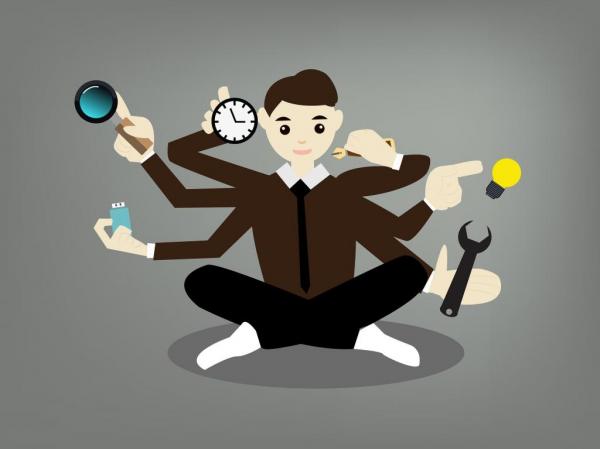By Esmée Hardwick-Slack

We’ve all been there, you’ve just arrived at work and before you’ve had time to take off your coat you’re already making calls, checking emails, arranging meetings and typing up reports all at once. Being able to multitask is often seen as a favourable skill, however, research has shown that it can actually reduce productivity by 40%. Some have suggested that multitasking is actually a myth and we’re actually just ‘task-switching’, rapidly switching focus from one thing to another.
Of course, being able to switch between tasks simultaneously may get more done in a shorter amount of time, but you aren’t completing these tasks as well as you could be. When we become used to spreading our attention across multiple tasks, we actually lose focus, making it difficult to distinguish priorities from distractions. Multitasking is fine for those less important, mundane tasks that don’t require much attention to complete, but if you have an important job or one that requires extra care, the best solution is to give it your full attention.
Here are a few suggestions to help you stop multitasking:
Avoid checking your phone
It may seem like this has nothing to do with multitasking, but checking your phone first thing in the morning can be a productivity killer. Many of us are looking at our tiny handheld screens and checking our emails within the first 60 minutes of waking up, this doesn’t allow your mind to ease into the day, instead, you’re instantly thinking about the 12 different things you need to do and splitting your focus from the get go.
Plan your day
When you don’t have a plan for the day, the day will create a plan for you, pulling you in ten different directions. Take the time to think about what you need to do and break down your priorities into three segments: morning, mid-day and late afternoon. This allows you to dedicate time to focus on your tasks, but also gives you space between priorities to handle any unexpected tasks that may arise. When you have a plan, your brain knows exactly what it wants to accomplish and will subconsciously prepare you for the day ahead. You will be more resistant to distractions, allowing you to focus on one thing at a time.
Don’t be afraid to say no
It’s easy to agree to do everything your co-workers ask of you, even the small things can build up and leave you biting off more than you can chew. Learning to say no doesn’t mean you have to be rude to everyone, it just means you shouldn’t say yes immediately. Letting your colleague know that you’ll think about what they’ve asked and will get back to them later, gives you more time to evaluate the situation and get back to what you’re working on.
Limiting distractions
Studies have shown that your brain takes an average of 25 minutes to return to the focus of your original task. Now, realistically you can’t block out every distraction, and frankly, there are times that you want your colleagues to know that they can come and ask questions, but this shouldn’t be all day. Even if you just give yourself an hour or two to focus, let your colleagues know that you’re not to be disturbed for that period (unless there’s a fire, of course).
Distractions don’t just come from those around you, but on your computer screen too. We’re all guilty of quickly checking up on social media, our phones or our emails for the 50th time while in the middle of doing something else. It’s difficult not to get distracted when we’re constantly being bombarded with notifications, alerts and pop-ups. If you have an important project that needs your full attention, it’s worth turning off all of your alerts and blocking websites like Twitter and Facebook, eliminating the temptation for a quick check in. It’s super simple but very effective in helping you focus on the task at hand.
How do you stay focused at work? Do you operate an open-door policy, or do you prefer set ‘office hours’ so your team know when they can pop in with questions? Let us know in the comments or join the discussion on Twitter.
Related Articles:
How to make the most of your commute
Could a 6 hour working day improve the economy?


